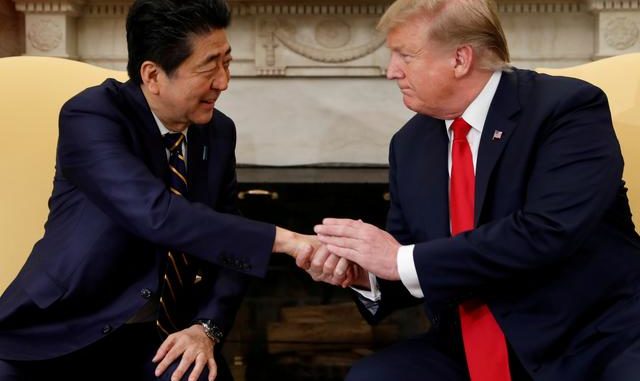
U.S. President Donald Trump said on Monday he had spoken with Japanese Prime Minister Shinzo Abe about North Korea and trade after North Korea raised doubts about the future of denuclearization dialogue with new weapons tests.U.S. President Donald Trump meets with Japan’s Prime Minister Shinzo Abe in the Oval Office at the White House in Washington, U.S., April 26, 2019. REUTERS/Kevin Lamarque
In a tweet, Trump described his talk with Abe, a close ally, as a “Very good conversation!” but gave no other details.
Trump and his administration have played down the North Korean weapons tests, which took place on Saturday, and which military analysts say could have involved short-range, ground-to-ground ballistic missiles.
Abe told reporters the United States and Japan would “respond together” to North Korea “going forward.”
RELATED COVERAGE
If the weapons were ballistic missiles, they would have been the first fired by North Korea since its 2017 freeze in nuclear and missile testing opened the way for dialogue with the United States and South Korea.
Analysts interpreted the tests as an attempt to exert pressure on Washington to give ground in denuclearization negotiations after a February summit between Trump and North Korean leader Kim Jong Un ended in failure.
In a Twitter message on Saturday, Trump said he was still confident he could reach a deal with Kim.
U.S. Secretary of State Mike Pompeo said on Sunday that Washington still had “every intention” of negotiating with North Korea. Pompeo said he and Trump spoke about the launches on Saturday and were “evaluating the appropriate response.”
“But … we’re going to exhaust every diplomatic opportunity there is,” he told CBS. “We still believe there is a path forward where Chairman Kim can denuclearize without resort to anything beyond diplomacy.”
Pompeo said the launches were “short-range” and that Washington had “high confidence” they did not involve intermediate-range missiles, or intercontinental missiles that threaten the United States. He said they had not crossed any international boundary and posed no threat to South Korea or Japan.
Separately on Monday, the State Department took aim at North Korea’s human rights record, saying that the government there had subjected its people to “egregious violations of human rights and fundamental freedoms” and that the United States remained “gravely concerned and deeply troubled” by the abuses.
“Approximately 100,000 individuals languish in political prison camps and their family members and children often suffer by their sides. Further, those trying to flee this oppressive environment, if caught, are often tortured or killed,” it said.
North Korea’s official media described the tests as a “strike drill” supervised by Kim to test “large-caliber long-range multiple rocket launchers and tactical guided weapons.”
Kim Dong-yub, a military expert at South Korea’s Kyungnam University, said the guided weapons could have been solid-fuel ballistic missiles with a range of up to 500 km (311 miles) that could neutralize the advanced U.S. THAAD anti-missile system deployed in South Korea.
White House economic adviser Larry Kudlow said on Friday that Washington and Tokyo may finalize a trade agreement by the end of May after Trump and Abe met at the White House last month.
Reporting by David Brunnstrom, Makini Brice and Mohammad Zargham; Editing by Susan Heavey, Jeffrey Benkoe and Jonathan Oatis
BY REUTERS
WASHINGTON (Reuters) –
